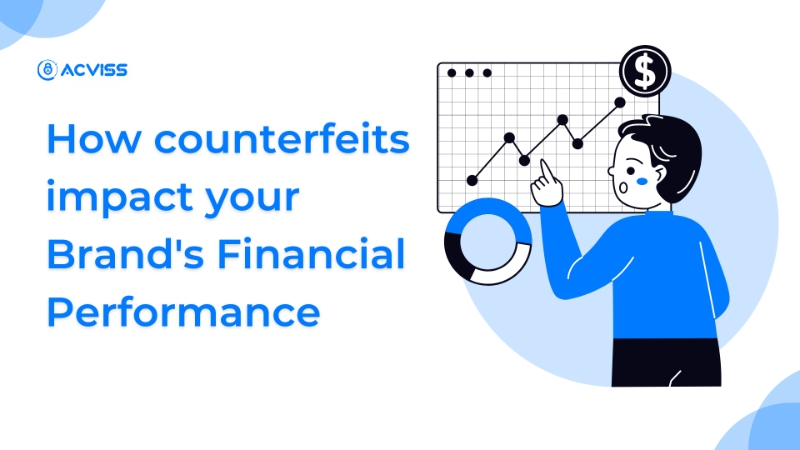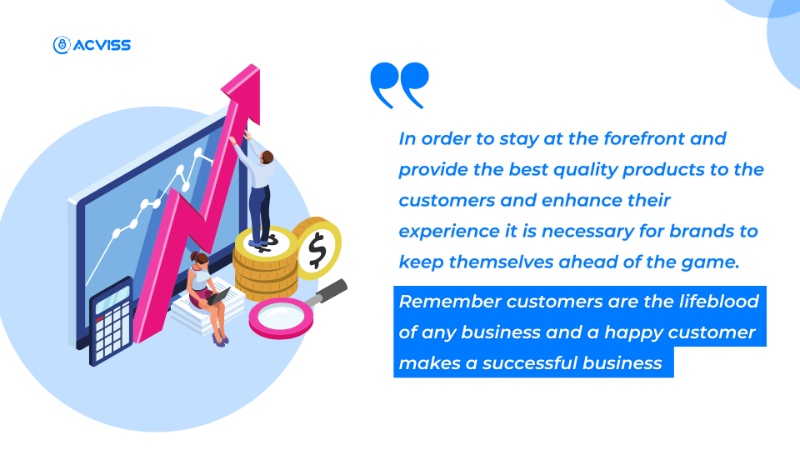Counterfeits Impact Your Brand's Financial Performance. Know how

You might think of counterfeiting as a harmless activity that only affects luxury goods, but it can actually have serious financial implications for businesses of all types and sizes. In fact, counterfeiting is a global problem that costs businesses billions of dollars every year. Counterfeiters are getting smarter and more sophisticated in their tactics and the consequences can be devastating for businesses. So, whether you're a manufacturer, retailer or consumer, the threat of counterfeiting is real and can have severe financial implications. Let’s dive into the impacts of counterfeits on your business.
The Revenue Losses
The most significant impact of counterfeiting on a brand's financial performance is the loss of revenue. Counterfeit products not only eat into a brand's market share but also lead to a decline in sales. It was found in a study that more than $98 billion worth of loss has been incurred in the retailer section due to counterfeiting, with over $30 billion of them happening on the online marketplace. In addition, businesses also have to spend money on legal and investigative resources to fight against counterfeiting, which further impacts their financial performance. Some of the major brands which have fallen prey to counterfeits are as follows.
Counterfeiting in Fashion Industry
One of the most actively targeted industries by counterfeiters, the fashion industry has been taking a hit for a long time now. It was estimated that a revenue loss of close to $28 billion is being incurred yearly. Their wide popularity and ease of replicating the product have made the industry vulnerable to fraudsters. Some of the most counterfeited brands in the fashion industry are
Nike: The globally renowned sportswear brand has been the centre of the target by counterfeiters. In 2018, the company estimated that it lost $3.8 billion in revenue due to counterfeiting. This loss of revenue not only impacted the company's financial performance but also affected its brand reputation and has resulted in bringing down the brand image in the consumer’s mind.
Louis Vuitton: The luxury brand has been the scapegoat of counterfeiters for a long time. In 2016, the company filed a lawsuit against a group of counterfeiters who were selling fake Louis Vuitton products online. The company estimated that it lost millions of dollars in revenue due to counterfeiting.
Rolex: In 2018, the company estimated that it lost $500 million in revenue due to counterfeiting. The loss of revenue not only impacted the company's financial performance but also affected its brand reputation.
Counterfeiting in Electronic Industry
An industry that is growing and is becoming more prone to illegal trade. There has been a drastic growth in the rate of counterfeit electronics in the market, most of them rely on cheap and subpar materials to replicate the product while keeping the same looks and physical appearances.
Apple: Apple is one of the most counterfeited tech brands in the world. In 2019, the company filed a lawsuit against a company in New York that was selling counterfeit Apple products, including chargers and cables. Counterfeit Apple products not only lead to a loss of revenue but can also damage the brand's reputation as they are of inferior quality.
Sony: The tech giant saw a steady rise in their names in the counterfeit market. Unlike counterfeiting their major products, fraudsters have been targeting the Sony batteries, which an ordinary person wouldn’t be able to differentiate and would occasionally pass off as an original. As a preventive measure, Sony came forth directly warning their customers about the fake batteries and how it can affect the product and the customer's health.
Counterfeiting in the Automobile Industry
Counterfeiting in the automobile industry is a growing concern, as it not only leads to financial losses for manufacturers but also poses significant safety risks for consumers. brake pads, airbags, steering systems and engine components are the most counterfeited parts. The value of the counterfeit automobile industry is more than $20 billion, making it one of the most counterfeited industries.
Mercedez Benz: The automobile brand has been targeted by counterfeiters since its inception. In 2021, the company found out that more than 1.86 million fake Mercedez products were being sold in India, which raised concerns across the globe.
Other Impacts on the Business
1. Legal Costs
Businesses also have to spend money on legal and investigative resources to fight against counterfeiting, which further impacts their financial performance. Legal costs can be substantial, especially if a brand needs to pursue legal action against multiple counterfeiters. The cost of investigating and identifying counterfeiters can also be significant. Businesses may need to invest in anti-counterfeiting technology to differentiate their products from counterfeits. All these costs can put a significant dent in a brand's financial performance.
2. Damage to Brand Reputation
Counterfeiting also damages a brand's reputation, which can have long-lasting effects on its financial performance. Counterfeit products are often of inferior quality and do not meet the standards of legitimate products. As a result, consumers who purchase counterfeit products may have a negative experience and associate it with the brand. This can lead to a decline in customer loyalty, and potential customers may not trust the brand, resulting in a decrease in sales.
3. Impact on Customer Loyalty
Counterfeiting not only impacts the financial performance of a brand but also affects its customer loyalty. If a customer purchases a counterfeit product and has a negative experience, they are unlikely to purchase from the brand again. This leads to a decline in customer loyalty, which can have long-lasting effects on a brand's financial performance. According to a survey by the International Anti-Counterfeiting Coalition (IACC), 52% of consumers reported that they would be less likely to purchase from a brand that they know had counterfeit products in the market and are unwilling to employ any measures to protect their customers as well.

Mitigating the Impact of Counterfeiting
Businesses can take several steps to mitigate the impact of counterfeiting on their financial performance. One of the most effective ways is to invest in anti-counterfeiting technology, such as proprietary labels, holograms, watermarks or unique serial numbers, to differentiate their products from counterfeits. Businesses can also work with law enforcement agencies to identify and shut down counterfeit operations. Educating customers about the dangers of counterfeit products and how to identify them is also crucial in mitigating the impact of counterfeiting.
Counterfeiting is a significant issue that affects the financial performance of businesses across industries. To stay at the forefront and provide the best quality products to the customers and enhance their experience brands must keep themselves ahead of the game. Remember customers are the lifeblood of any business and a happy customer makes a successful business. Get in touch with us to learn more about your counterfeit problem and how to tackle it.
